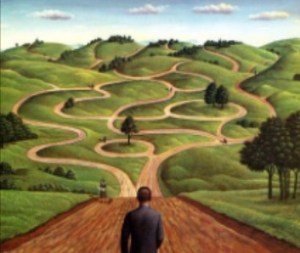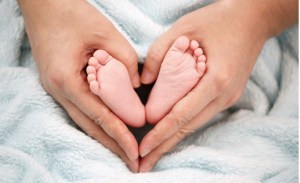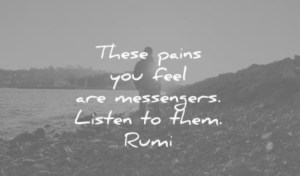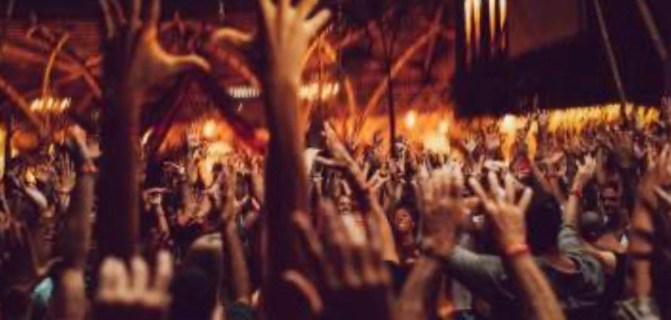If you do not change direction, you may end up where you are heading
Lao Tzu
It’s a long road that has no turning (from an old Irish proverb).
I’m sure many of you can relate. Perhaps some people travel steadfastly and happily on a long straight road, the distant horizon forever in sight, as long as they keep putting one foot in front of the other. But I guess most of us chop and change directions and take u-turns and many detours. That’s just life.
And regardless of whether we’ve been on a road with no bends or a windy track, most of us have travelled through a few pivotal moments in our lives when we’ve had to reconsider or take stock and start anew. Do you sometimes find it interesting to look back and realise the incredible journeys we’ve had, and to remember the combinations of circumstances and your choices that led you to change your life forever; the transformative experiences and sliding door moments?

I’ve reinvented my life a few times, sometimes through circumstances out of my control, and sometimes through difficult decisions. Sometimes because the universe and reality slapped me hard. One such pivotal moment happened in Bali, an island where roads are narrow and windy.
I’d just spent eight days with a group of twenty-four yoga teachers from around the world, at an Immersion in the Yoga and the Psychology of Chakras. In a beautiful big open-air yoga shala which overlooked a burbling stream in the jungle, with the backdrop of gecko calls and the constant piercing screeching of cicadas, we’d connected our energies, practised yoga and meditation and pranayama and dug deep into our own inner journeys. We’d sat in circles and shared our vulnerabilities and strengths in revealing conversations. And we’d freeflow danced to Xavier Rudd’s Spirit Bird on the beautiful wide-plank shala floor. We’d been blessed by a drenching of holy water in a mountain water temple. We’d held each other while allowing our crown chakras to open! We’d drowned in sound baths of didgeridoos and velvet voices, we’d let go of hurts and secrets in fire ceremonies and I’d been cradled through the beauty of waksu, floating in a hyer-salty pool. It was all pretty cool stuff, I can recommend you include these experiences in your travels!
But those spiritually rich and de-armouring moments were not the transformative event this story is about; they just led me into it.
At the end of the immersion we all hugged our goodbyes. It was Friday and a few of the group were staying on for one last night in Ubud. They encouraged me to join them at an ecstatic dance.
Ecstatic dances are popular in Ubud. Thus far I’d resisted going to one. I had snuck a peak at one of the regular Sunday morning sessions at the famous Yoga Barn. I’d watched the writhing bodies gyrating like dying fish, the massive yoga shala may as well have been a fishing trawler’s deck. The music was horridly electronic with a thumping bass. It hadn’t appealed to me. I love freeform dancing, with space around me, with friends under a full moon, and with my idea of beautiful music. But on that day the ecstatic dance I saw grossed me out.
I was still in a fragile state, not really allowing myself to have fun while the million shards of my heart still hung heavy inside me. It wasn’t just survivor’s guilt – that for sure happens when we grieve – it was simply sadness. Grief and joy were mutually exclusive. And crowds and noise still made my heart rate go through the roof and squashed my chest to push breath from my lungs. And to be honest, I just didn’t feel like coming close to the bodies of strangers, especially any that might tend to overshare their vibrations, or dance with any hint – platonic or otherwise – of intimacy.
But this Friday evening, at the end of such a transcendent week, I grappled with self-talk and self-doubt. I wanted to be with my new friends to celebrate and say goodbye. I questioned myself. Was I being too sensitive, too judgemental, too boring, too prude, too old, too scared, too stiff, too stuck? And then I berated myself for questioning myself.
Eventually I decided to go. The universe will look after me, I thought.
So I messaged my friends and stepped out the door, determined to overcome any hesitancy. But, within minutes, as I was walking down the road and sidestepping tourists strolling out to dinner, my mind started to vacillate, again.
This is stupid, I don’t want to dance with a mass of sweaty strangers.
Stop being so negative, you might even enjoy it.
But I’m not ready.
I’ll be safe with friends.
Suddenly I got cold feet. A feeling of certainty hit deep in my gut. I really did not want to join the mass of new-age spiritual, experience-seeking travellers and quasi-healers tripping on whatever it is that is floating in the air of some of the Ubudian yoga studios. It was not my scene. I should instead turn back, and relax in my hotel with a good book. It was, after all, ok to say no.
Indecision has been a wearisome companion on my entire life’s journey. I question things, especially myself, constantly. And I think this time, the universe got sick of it.
Ubud’s sidewalks are notoriously uneven and hazardous with big gaps between concrete slabs. Many of the concrete slabs are broken, with rusty steel reinforcing rods jutting out. Water and trash flows, or doesn’t flow, in the gaps underneath. As I navigated the terrain, lights from shops and motorbikes reflected off my glasses, blinding me.

I turned around and started to walk back and, stupidly, one of my many foolish moments, I did not stop walking while I pulled out my mobile phone to message my friends to send my apologies. The glare from the screen blinded me further and in an instant, I fell. My leg disappeared down a hole.
I dragged my foot out, and with the torch on my phone I saw it was awash in dark red. Blood was pouring out and over my flip-flop.
Pain hadn’t arrived yet. People helped. We tried to clean it. I was taken to a clinic, where the doctors took one look at my poor foot and sent me off in a rickety minivan ‘ambulance’ to a hospital in Denpasar. The pain had kicked in by then. It was like I had restless leg syndrome and my body wanted to dance too, spastically, to escape the fire burning in my sole. For a while I was flooded with self-pity. Why me. Why couldn’t life be pain-free for just a while; why couldn’t the road have no turnings.
To make matters worse, my phone battery was almost dead. I messaged my son, asked him to let others know. I checked my insurance details, then switched it off to preserve it, in case. I was on my own.
In the hospital I waited for ages. Still my foot was dirty, still no bandage, but the bleeding had settled. I had visions of dying a week later, all alone, in this Bali hospital or on the street from some tropical infection or septicemia. Eventually a doctor came to fix me, he carried a bowl with suture materials ready to go. I told him he must X-ray it. I insisted he thoroughly clean it. He had a kindly face, but I knew enough about medicine to know that things weren’t heading in the right direction.
He said, I want to get a better look at it first. And then he tried to inject local anaesthetic into the fleshy mangled tissues of the sole of my foot. I screamed. I’m not a screamer. Have you ever had your sole tickled? You know how sensitive it is right? Try sticking a needle into the depths of it.
The doctor gently said I must be strong, and he tried again. This time I nearly hit the roof. I swear if his assistant hadn’t been leaning over me heavily, pinning me down, I would’ve. The pain was insane.
After their third attempt I put my foot down (figuratively). Stop! I said. Enough! And insisted on getting an xray, a general anaesthetic and a thorough surgical clean before they closed the wound. On one percent battery I made a frantic but determined call to the insurance company who thankfully gave a fast approval.
As they wheeled me into the theatre, the anaesthetist told me this type of wound wasn’t uncommon. Many people misstepped on Balinese footpaths and had the lovely misfortune of having one of those rusty steel rods stab them.
Finally at three o’clock Saturday morning, I woke from the little operation. There was no foreign body, but the hole and the damage had penetrated into one of my tendons and extended almost entirely through to the top of my foot. According to those reflexology foot charts of our internal organs (I looked this up later) the steel rod had speared straight through my heart.
The doctor had done a neat job of suturing it together, but it would take some time for the inside to heal. I spent the next fifty hours, alone, in a private room with no window, no balcony, no tv, no phone, no book, no friends, no family. I didn’t even have my handbag. Fifty hours perhaps doesn’t read like much, but it sure seemed long at the time. Unlike in Australian hospitals where you never seem to get a break from the constant interruptions of nurses and orderlies, intruders in this hospital were rare, and even when they did come in they spoke almost no English. Still, I asked each of them if anyone in the hospital had an iPhone charger I could borrow. Locals in Bali rarely have iPhones and turns out even doctors and nurses didn’t. Saturday morning slowly rolled into Saturday night and then Sunday morning, and slowly into Sunday night and eventually into Monday. Apart from my arm being connected to a drip that gave me a constant infusion of antibiotics and painkillers, I was disconnected from the world, with only my thoughts for company.
I thought about my feet.
Have you ever given much thought to your feet? In some spiritual traditions, it’s believed your body and soul are connected and even embodied in the soles of your feet. And in several religions, it is a humble act of humility and reverence if you wash someone’s feet.
I thought a lot about the incredible realisation that my little feet had carried me every single step of the way, throughout my entire life.

How many steps would that be? They’d carried me when I took my very first steps as a baby in Utrecht. In my first roller-skates they’d taken me down the sides of dykes where we lived in a little village near Rotterdam. They’d kicked me through the water of countless swimming pools, seas and oceans. They’d stepped deep into stirrups of saddles on the backs of countless horses. They’d pushed the first pedals in my first car, a tiny Mini Moke which I drove to Brisbane on Friday night dates with my first true love. Twice they’d paced the floor carrying the added weight of my round belly in the Mater Mothers Maternity Ward, and then a million more steps as I carried my kids in my arms and on my hips. And they’d walked me, unsteadily, into the law court to fight my husband in our divorce. Swishing down slopes, trudging bush paths, pounding the pavements in Paris and Budapest, Brussels and Siem Reap; they’d even done some fancy new steps not long before at latin dance classes with Harley.
I’ve always loved walking. I used to be able to walk all day and never tire. I still dream of doing pilgrim walks like the Camino de Santiago. For years I looked forward to retirement when I’d have the time to tramp mountains in NZ, wander hills and valleys in the UK, explore the wilderness of Tasmania and maybe even Mongolia and Japan. Dreams of distant adventures, often on foot.
My amazing feet had been with me, supporting me, around every turning on my road. And yet, apart from a thai foot massage I once had in Bangkok, I’d never ever taken the time to care for them, or even consciously appreciate them.
I had a pencil that was for filling out the little forms to order my hospital food. I asked but nobody had any paper, so I covered a thin paper napkin with a thousand words. I wrote a poem about reverence to feet. I wrote about my windy bumpy road. I asked the universe what the big deal was with ecstatic dances. And why did I have so much trouble making decisions. I thought about the many wrong steps I’d taken in my life, most of them because I hadn’t trusted my gut. I thought about my fifth chakra, and the need for me to learn to trust and speak my truth.

Reflecting on my long life which, granted, has been privileged and blessed always with two healthy feet to carry me, I realised with clarity that for most of my adult life I’d been walking with my two feet going in different directions.
As a young adult I had one foot in a stirrup on horseback out on the land, and the other with its toes sinking in the sands of a beach. During my marriage, I had one foot digging its toes in that relationship and all that came with it, and the other trying to make a break. During the last few years, after it finally did break, I’d had one boot stuck working in an industry in which I no longer felt I belonged while the other tap-danced amongst a beautiful community of musicians and choristers. I’d been torn apart for too long. It was time to find my footing, bootless, with both feet firmly on the ground of the same path.
And so it was that I decided in that hospital bed to not go back to my previous life. I decided I would no longer wear my Blundstone work boots. I needed a place to slow down. To rest. No more therapies and counselling. I needed more time alone, with my toes in sand.
That long weekend was tough. But on the other hand it was revelatory. One can only imagine how transformative years of isolation might be. Not that I think we should live in remote caves to find enlightenment or god or ourselves. I don’t believe in spiritual bypassing. I believe that all of life’s everyday mundanities, tragedies and joys are enough for us to learn and grow from. I believe we can only find our consciousness while our feet are connected with the earth beneath us. But for sure, some time alone, even with a good dollop of pain to plonk you in the now, is helpful to reconsider the road we’re on.
Finally, Monday afternoon came and I was discharged. They called me a taxi to take me back to my hotel in Ubud. I was on crutches with sutures in my sole so I couldn’t do much, certainly not dance, and my quiet time continued.
I had two weeks left on my visa but I ditched my plans for Bali. The busy black-sand beaches and busy streets weren’t cutting it for me. One of my friends from the Chakra immersion who was still in Ubud told me about Gili Meno, a tiny white-sand island off the coast of Lombok where the ocean was the clearest and bluest blue, and where there was no traffic at all and no dangerous sidewalks.
I had to rest first and elevate my foot for a week but then I planned to go there. I did not question myself. Despite the doctor’s advice, I knew the sea would be good for me and I could remove the sutures by myself.
Coming down the mountain out of the incredible but sometimes claustrophobic jungle of Ubud and seeing the ocean and the horizon for the first time in six weeks was amazing. I sat up top on the deck of the boat as we crossed the Lombok Strait, and the salty air cleaned my lungs. We arrived at the island and, still quite lame, I dragged my suitcase through the deep sand. I knew even before I got to my hotel, without a doubt, that I’d made the right decision.
And that, my friends, is the story of how I came to Gili Meno. A place where I could heal my foot and my heart, and start on a new road. A road that has finally allowed me to follow a passion I’ve had ever since I was a young girl, which is to write. My life has been a windy road for sure, and I still haven’t gone to an ecstatic dance. Have you? Maybe one day I will.
You have brains in your head, you have feet in your shoes,
you can steer yourself any direction you choose
Dr Suess
